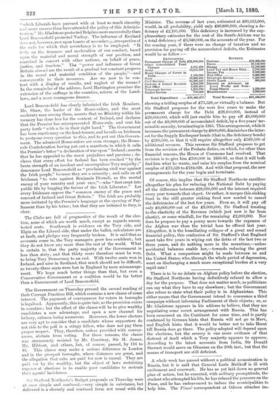Sir Stafford Northcote's Budget proposals on Thursday were at once
simple and confused,—very simple in substance, but delivered in a slovenly and confused form not usual with the Minister. The revenue of last year, estimated at £83,055,000,. would, in all probability, yield only :880,860,000, showing a de- ficiency of £2,195,000. This deficiency is increased by the sup- plementary estimates for the cost of the South-African war to a total deficiency of £3,340,000, on the accounts of the year. For the coming year, if there were no change of taxation and no provision for paying off the accumulated deficits, the Estimates. would be as follow :—
EXPENDITURE. REVENUE.
Permanent Charge of Debt 228,000,000 Customs 219,300,000
Other Consolidated Fund
Excise 26,140,000 Charges 2,757,478 Stamps 11,100,009
Army
15,541,300 Land Tax and House Duty... 2,760,000 Home Charges of Forces in
Income Tax 9,000,000 India 1,100,000
Post Office
6,400,000 Navy 10,492,935 Telegraph Service 1,420,000 Civil Services 15,436,442 Crown Lands 390,000 Customs it Inland Revenue 2,816,709
Interest on Advances on
Post Office 3,420,404 Local Works and Suez-
Telegraph Service 1,210,736 Canal Shares 1,250,000 Packet service 710,468 Miscellaneous 3,800,000 Total Expenditme £81,486,472 Total Revenue 121,560,000
showing a trifling surplus of £73,528, or virtually a balance. But Sir Stafford proposes for the next five years to make the permanent charge for the Debt £28,800,000, instead of £28,000,000, which will just enable him to pay off £6,000,000• out of the £8,000,000 of accumulated deficit, by a five years' ter- minable annuity, terminating in 1885. This arrangement, while it increases the permanent charge by £800,000, diminishes the inter- est for the Supply Exchequer bonds (that is, the deficiency bonds) by £210,500, so that it will require altogether only £589,500 of additional revenue. This revenue Sir Stafford proposes to get from the revision of the Probate duties, on which, for other than financial reasons, the House of Commons had resolved. That revision is to give him £700,000 in 1880-81, so that it will both find him what he wants, and raise his surplus from the nominal surplus of £73,528 to £184,028. And with that proposal, the new arrangements for the year begin and terminate.


































 Previous page
Previous page